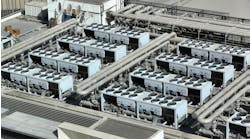Small spaces and areas that need supplemental cooling can be a tough puzzle to solve for building owners and managers when it comes to meeting green goals. If a central HVAC system isn’t solving the problem, building owners may opt for window units or other smaller solutions for individual spaces. This strategy means the supplemental HVAC is consuming additional energy on top of whatever the central system requires, and the need for extra cooling in certain spaces may make it hard to decrease energy use overall.
However, one single-space solution—solar-powered HVAC units—may make it easier for consumers to cool individual spaces while still conserving energy.
[Related: 3 Tips to Integrate Better HVAC Controls]
How Solar-Powered HVAC Works
The common thread between different manufacturers is a small HVAC unit that connects directly to solar panels. Different manufacturers’ designs utilize the solar power differently—in some cases, the solar panels become part of a solar thermal system.
In the case of HotSpot Energy, a Virginia-based manufacturer, the mini-split HVAC unit simply draws its power from dedicated solar panels first instead of grid power. The units provide both heating and cooling and are designed as hybrid systems that use solar power first if it’s available, then make up any shortfall with grid power. If they can’t draw grid power—for example, during a power outage—the units adjust their maximum capacity to use whatever solar power is available.
“The unit will always look at solar to get all of its power,” explained HotSpot CEO John Williams. “If it can’t get all of its power from solar, it will pull some extra power from the AC connection.”
The units are popular for small spaces, Williams said, such as retail stores, additions that aren’t connected to HVAC ducts, converted garages or workshops that don’t have ductwork, dormitories and studio apartments, or classrooms.
They can also be used to augment the work of central systems in locations with tiered electricity rates, Williams said. Transitioning some of the cooling to a solar-powered system allows you to take a little off the central system’s load. “It makes it easier for the main unit to catch up [afterward], and you can avoid that time period where the electricity rates may be double or triple,” Williams explained.
[Related: Top Tips for Integrating Solar Panels On Your Commercial Building]
How Efficiency is Calculated
HVAC systems commonly use the Seasonal Energy Efficiency Ratio, or SEER, as a shorthand for energy efficiency. They can range from 13 to more than 30, allowing consumers to easily compare the efficiency and potential operating costs of similar systems.
HotSpot’s units have a SEER of 22 or higher, landing solar-powered units squarely among conventional grid-powered units when it comes to efficiency. If central heating and AC just aren’t cutting it for your building, solar-powered alternatives are one option that can increase a space’s comfort without spiking your energy bills.
Read next: Do Solar Panels Work in Bad Weather?



